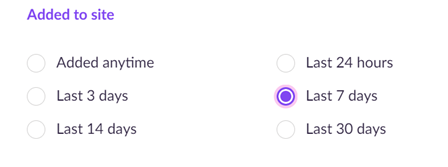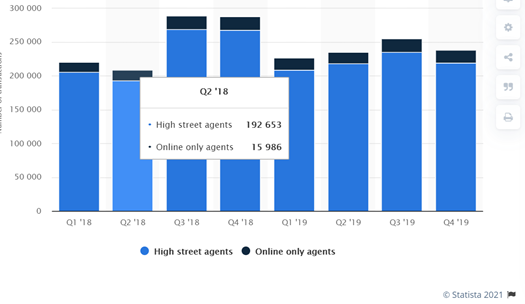
So, you’ve decided to sell your home and move on. Congratulations! Plenty of others are on the same path as you are right now. One of the first steps to getting this whole moving thing right, is choosing the correct estate agent. So how do you choose the right one?
Do you rely on word of mouth? Online reviews? The agents offering you the highest valuation for your property?
Most people seem to do fine with whichever company they choose, right?
Wrong.
An annual report by the Property Ombudsman shows a long term trend that sees customer complaints of estate agents rise year on year. It seems many of us simply don’t have trust, seeing them as a necessary evil to get our properties sold at the best price, as quickly and efficiently as possible.
It needn’t be this way.
There are, in fact, agents out there who want nothing more than to get you the best possible service and price for your home, with the absolute least amount of stress. That’s the good news. They’re smart enough to realise that if they deliver an exceptional customer experience, you’ll come back to them next time you want to move.
Now the bad news – there are just as many estate agents who care more about profit than service.
So, how do you find the diamond among the stones?
Don’t leave it to guess work. Read on to find out exactly how to choose not just a good, but a great, estate agent.

It’s a given that you should always shop around before selecting an estate agent. Compare reviews, valuations, customer service, proposed marketing efforts and, of course, fees.
However, don’t fall into the trap of just choosing whoever gives you the highest valuation, and don’t just opt for the lowest fees.
First, let’s talk a little more about valuations.
Estate agents want to make you happy so that you’ll do business with them. Good agents want to make you happy by being honest, delivering the best possible service, and hoping that you’ll trust them enough to come back in the future.
Others do it by overpricing your home and giving you unrealistic expectations of how much your most prized financial asset could give you. They rely on the fact that emotions are involved and can overshadow any rational thought.
If the valuation you’re given is too high, and as a result you fail to attract any interest from potential buyers in the first ten days of your property being listed online, then you’re likely facing a longer time on the market and/or a price reduction.
It all comes down to search engines. Just like companies who compete to get their websites shown at the top of Google, online platforms like Zoopla, Rightmove, OnTheMarket, and PrimeLocation are search engines, too. Buyers can filter results to show properties that have been listed, for example, in the last seven, ten or fourteen days.
Most people select properties added within the last seven days, which means the first seven to ten days of your property going on the market are the most crucial.

If you miss the boat in this time period, then in order to generate that same level of interest after the ten day mark, you may well be facing a 1-2% price reduction for the search engines (depending on their individual algorithms) to show your property on the first page again.
This is one of the reasons it’s so important to try and choose the right agent from the outset.
How do you know if your valuation is too low, too high, or spot on?
There’s a process that agents go through in determining your valuation – a combination of research and local knowledge.
The agent, if he or she is experienced in selling properties similar to yours and in roughly the same location, will know what other houses have sold for nearby, as well as influencing factors such as local amenities, reputation of nearby schools, crime rates, room sizes, attractive internal and external features, and so on.
The more experience your agent has in selling properties similar to yours in the same area, the easier and more finely tuned this process is.
Ask the agent to show you evidence to support their price suggestion, which should include a list of similar, now sold, properties that have gone for roughly the same amount. Pay attention to length of time on the market, too. If they can’t provide evidence to support their figures, then move on.
When it comes to selling and buying homes, choosing a local agent with specialist knowledge of the area and experience of selling your type of property is key. An agent who supports (and therefore knows well) the local community and has the time to listen to your needs – is what you should be focusing on above all else.
This is far more important than simply choosing a well-known, big name brand who claims to do everything, for everyone.

Does the estate agent already have a list of potential buyers, people who will most likely be interested in your type of property, whom they can contact? If you’ve chosen a company with plenty of local knowledge and a good few years of experience, then they should have a good list.
And how are they going to contact these possible buyers? Simply sending an email doesn’t cut it. Remember, in the first ten days of your property being listed online, it’s all hands on deck, which means your agent should be getting on the phone and doing some outreach as soon as possible.
Don’t be afraid to ask about marketing efforts involved in selling your home, although a great estate agent should be telling you all about their marketing process before you even need to ask.

Most estate agent fees in Scotland are based on commission, so your agent gets a percentage of what you make once your property sale has been completed. The advantage here, and it is a BIG advantage, is that it gives the estate agent an incentive to work hard.
Here’s why this is so important.
In 2005, a survey conducted found that almost half of all people using an estate agent considered them lazy. They felt that not enough effort was being put in, and sellers were being given excuses for why properties languished on the market and then faced reductions.
Now, that was quite some time ago, and thankfully a lot has changed since then. Competition among property professionals is fierce, and many are motivated to do well. However, this isn’t the case with every type of estate agent, and there are key differences between online estate agents and those on the high street.
While online estate agent fees tend to be lower overall, which can be attractive when you’re putting your home on the market and weighing up all the costs, this can cost you more money in the long run.
Some online agents (not all) require a full, non-refundable payment at the outset, whether they sell your home or not and these prices are typically the most attractive. The downside here, other than the obvious fact that there is little incentive to sell your home, is that there is significantly less local knowledge than that of a high street agent.
Hopefully, if you’ve read this far, you’ll be aware of just how important this local knowledge is. It’s crucial.
Research has shown that if you’re willing to pay a little more for a great estate agent who has experience and local knowledge, together with the ability and resources to sell your home fast and for the optimum amount, you’ll easily make up for that fee with the extra profit you make in your sale.
A study conducted by The Advisory showed that the best local estate agents got sellers on average a 5% higher sale price than the best online estate agents. So, although you have the option of saving at the outset by using an online agent, it could cost you more at the end of the process.

The chart above shows the amount of people who still prefer to use a high street estate agent over an online agent. The difference is significant. Why? Because for most of us, our property is our biggest financial asset, and this means we want to physically enter a store and talk to someone.
In short, if you have the financial means, don’t scrimp on fees. For commission-based fee structures, you should typically expect a quote of around 1% to 3.5% of your property’s final sale price. If it’s on the higher end here and the agent has a solid reputation, there will most likely be a good reason for the higher fee – better marketing efforts, more local knowledge or expertise and maximum exposure to your property. The more eyes on your home, the better and faster your sale.
If, on the other hand, they can’t seem to justify the extra cost, keep on shopping around.

To find out how good your agent’s sales abilities are, listen carefully to how he/she comes across to you. Are they pleasant and gently persuasive? Do you have a good rapport with them? Do they come across as confident (but not cocky), and knowledgeable?
If you’re convinced by their pitch, and it doesn’t even sound like a pitch, it’s highly likely others will be too. On the other hand, if you feel like you’re being ‘sold to’, then walk away.
Finally, make sure you’re willing to work with your agent as a partnership. It’s not about hiring someone to do all the work while you sit back and wait, and neither is it about micromanaging everything they do. You hired your estate agent for their knowledge, experience, and overall expertise, so trust that the advice they give you is accurate and in your own best interest, even if it’s not always what you want to hear.
At the end of the day, you both want the same thing.
Do you need some advice on choosing and working with the right estate agent? At All About the Move, we only work with people we implicitly trust. We can help and answer questions on every aspect of your move, from choosing the right estate agent, to completing the right paperwork, home staging, packing, removals, and much more.
Give us a call on 0141 374 0373 or contact us at www.allaboutthemove.co.uk to see where we can help 😊